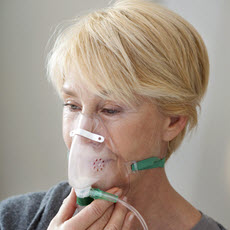
What is respiratory failure?
Respiratory failure is a condition in which your blood doesn't have enough oxygen or has too much carbon dioxide. Sometimes you can have both problems.
When you breathe, your lungs take in oxygen. The oxygen passes into your blood, which carries it to your organs. Your organs, such as your heart and brain, need this oxygen-rich blood to work well.
- Respiratory Failure (National Library of Medicine)What is respiratory failure? Respiratory failure is a condition in which your blood doesn't have enough oxygen or has too much carbon dioxide. Sometimes you ...
- Hereditary myopathy with early respiratory failure (HMERF) is an inherited disease that affects muscles used for movement (skeletal muscles) and muscles that are ...
- Complications may include: Poor organ function Respiratory failure Shock
- Respiratory failure, acute respiratory failure, chronic respiratory failure, ventilator, CPAP, Extracorporeal membrane oxygenation, ECMO
- A tracheostomy is surgery to create a hole in your neck that goes into your windpipe. If you need it for just a short time, it will ...
- Lung Diseases (National Library of Medicine)... breathing problems. Some lung diseases can lead to respiratory failure. Dept. of Health and Human Services Office on Women's Health
- Complications may include: Respiratory failure Liver failure Heart failure Kidney problems
- ... an inherited condition that causes muscle weakness and respiratory failure typically beginning in infancy. Early features of this ... of the disorder later in childhood.Soon after respiratory failure occurs, individuals with SMARD1 develop muscle weakness in ...
- Blood gases are a measurement of how much oxygen and carbon dioxide are in your blood. They also determine the acidity (pH) of your ...
- Pursed lip breathing helps you use less energy to breathe. It can help you relax. When you are short of breath, it helps you slow ...



